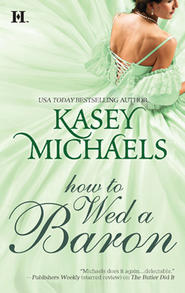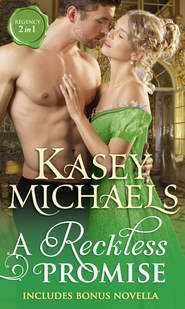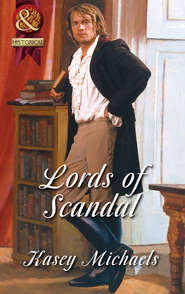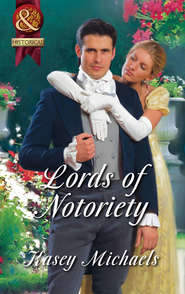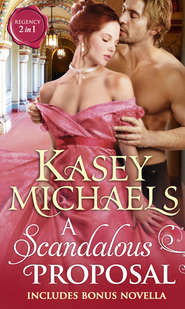По всем вопросам обращайтесь на: info@litportal.ru
(©) 2003-2024.
✖
The Bride of the Unicorn
Настройки чтения
Размер шрифта
Высота строк
Поля
Morgan ignored her questions and asked one of his own, not of Peaches, but merely rhetorically. “Where is this fellow Woodwere? That dwarf said I should wait here for him. I doubt I should tarry too long, for this is such an insane quest that it would be no great wonder if I ended the day locked inside this madhouse myself.” He turned to look at Peaches, still unable to believe the woman was proud of what she had done. “A madhouse. How could you have steered Caroline—any child—into employment in such a pesthole?”
“Because there weren’t no better openin’s hereabouts for earls’ daughters, I suppose,” Peaches shot back, jamming her fists on her hips. “Ye beat Banaghan for fanciful notions, yer worship, do ye know that? And where else was I apposed ta put her, I ask ye? The local workhouse? Caroline wouldna lasted a fortnight there.”
“A-hem.”
Morgan wheeled about in the chair to see the dwarf standing just at the edge of the threadbare carpet. “What is it? Didn’t you locate Woodwere?”
“No, I didn’t, which isn’t surprising, because I didn’t go looking for him,” the dwarf answered solemnly, then grinned. “But I did tell Miss Monday about you and the Irishwoman. You can come upstairs, if she comes with you,” he said, indicating Peaches with a slight inclination of his large head. His smile disappeared as he added, “What did Caroline do wrong, sir? Is this about the oranges?”
Morgan stood, then retrieved his hat, gloves, and greatcoat from a nearby table. “No. Oranges do not enter into any business I have to discuss with Miss Monday, although you have piqued my interest, Mr.—”
“Haswit. Frederick Haswit. But you can call me Ferdie, since you’re not here about the oranges. Unless you’ve come about that bolt of cloth, of course. But you don’t look any more like a draper than you do a greengrocer. What crime of Caroline’s are you here to punish?”
“Ah, and it’s keepin’ her hand in, our Caroline is,” Peaches said happily, walking over to pat Ferdie’s misshapen head. “Taught her all she knows, I did, and it’s a pretty fair teacher I am, too, even if I’ve lost the touch a mite. The rheumatism, ye know. Else why would I be workin’ with foundlin’ brats, only the good saints could say. It sure an’ isn’t because Mary Magdalene O’Hanlan cares a clip about the creatures. A roof over me head and a dry cot, that’s all I cares about now—and mayhap a little reward for doin’ a good turn now and again. Come on, little fella, fetch me ta Caroline.”
Morgan lifted his eyes to the chipped paint of the ceiling and silently cursed his dead uncle who, he believed, was probably grinning up at him from the bowels of hell at the moment, enjoying his nephew’s predicament immensely, then followed after Peaches and Ferdie as they left the room and walked toward a wide flight of stairs.
As the marquis walked along, he took out his pocket watch, glanced at its face, and was faintly surprised to see that it was only a few minutes past five. It should have been later, considering all he had been through already this day, since encountering Peaches that morning at the orphanage fifteen miles away in Glynde.
But now, at last, the moment had arrived, and he was about to come face-to-face with one Caroline Monday, who might or might not be Lady Caroline Wilburton, who as a child of three had disappeared without trace from the scene of her parents’ brutal and still unsolved murder.
Morgan had been only fifteen when he saw young Lady Caroline for the first and last time. He had very little remembrance of her beyond a hazy impression of blond hair and very sharp elbows, one of which she dug into his ribs when, at his mother’s orders, he attempted to pick her up as she teetered precariously at the edge of the fish pond while Morgan, Jeremy, and their parents were at Witham for a visit.
He remembered the earl and his beautiful young wife much better, having suffered an impressionable youth’s wild infatuation with the countess, Lady Gwendolyn, that hadn’t lived out the summer. News of her horrific death that October had reached him at school, and he had immediately remembered his supposed deathless passion for the woman, which caused him to sink into months of melancholy, during which he produced the only poems he had ever penned in the name of Grand Romance.
As he climbed the stairs, Morgan conjured up a mental picture of Lady Gwendolyn, sure that the real Caroline, whom everyone had searched for, then presumed dead all these long years, would be the picture of her beautiful, sweet-smelling mother. That was all that this visit to madness would take, he was sure, one quick, assessing look—and then he would be on his way back to Clayhill and sanity and, of course, his solitary thoughts of revenge.
“This way, sir,” Ferdie called back to Morgan. The dwarf was already dancing down the long hallway in the direction of the single open door at the end of the passage. “Miss Twittingdon is waiting for you. But don’t mind her—she’s an inmate, if you take my meaning.”
“She’s one of the loonies, ye mean,” Peaches—whose steps had slowed as she gained the hallway—said, her usually booming voice lowered to a whisper. “And what would ye be, Ferdie, iffen ye don’t mind me askin’?”
Ferdie pulled himself up to his full height, which brought him just past the bottom button of Morgan’s waistcoat, and announced:
“All men are measured alike in the eyes of God;
but a father’s vanity gauges with a different rule.
A mother’s love protects while she has life,
but once she is gone, naked hatred runs rife.
Hide him away, secrete the embarrassing Haswit.
Remove him, forget him, brand him a half-wit!”
Morgan looked down at Frederick Haswit, really looked at him for the first time, and felt a twinge of guilt. He had dismissed the youth, who looked to be at least in his late teens, as being faintly feebleminded merely because of his size, assuming that Ferdie was incarcerated at Woodwere because that was where he should be. Granted, the fellow was vaguely eccentric, spouting bad poetry at the drop of a hint, but did he really need to be hidden from the world, locked away from a normal life?
“Haswit. You can’t be Sir Joseph’s son, can you, Ferdie?” Morgan heard himself inquiring, not realizing that he had come to that conclusion until he spoke the question aloud. “Sir Joseph Haswit. As I recall, he resides in London year-round and is known to be a childless widower.”
Ferdie’s expression was painful to see. “As he sees it.”
“I’m sorry,” Morgan said sincerely. “We English can be remarkably cold bastards.”
Ferdie tipped his great head to one side, and his painful grimace became a smile in earnest. “Not to worry. The world will come to an end in eight months anyway. Eight months, three weeks, and four days, to be completely precise about the thing. Nobody can stop it. Everything has to balance out.”
Peaches backed up until she was pressed against Morgan’s side. “More’n a few slates offa this one’s roof, yer worship, and don’t ye know,” she whispered to him out of the corner of her mouth. “If it’s wantin’ me ye’ll be, I’ll be in the coach, m’shiverin’ body stuffed under the lap rug, and mumblin’ a prayer ta the Virgin—iffen I can call one ta mind.”
Morgan grabbed hold of Peaches’s elbow as she attempted to back toward the staircase. “In eight months, you say, Ferdie,” he said calmly. “You seem very precise about that. I wonder why.”
“Eight months, three weeks, and four days. And why not?” Ferdie answered, evading Morgan’s searching look. “June 7, 1816. It’s as good a day as any to die.”
“I imagine you might have a point there, Ferdie,” Morgan said consideringly, remembering the horror in his uncle James’s eyes as that man had gasped for his last breath. “I doubt the day matters much to a dying man. It’s only what that man may have done while alive that puts the fear of the Hereafter into him.”
“The dear Christ preserve us, and it’s as queer as Dick’s hatband ye are, the both of ye!” Peaches exclaimed in high hysterics, pulling against Morgan’s grip on her arm, her eyes wide with fear. “Caroline! Caroline! Where be ye, gel? And it’s a pair of bleedin’ madmen ye should be savin’ yer dear Peaches from, don’t ye know! Where are ye, Caro?”
“Peaches! Is that you? Oh, Peaches—I can’t believe it!”
Morgan looked down the hallway, following the sound of the female voice calling out the Irishwoman’s name, to see a thin snip of a girl dressed in little more than rags barreling at him full tilt, her well-shaped legs bare nearly to the knee.
Behind her, standing tall in the doorway, appeared a woman dressed from head to foot in brightest scarlet. “Dulcinea!” she cried, bracing her hands against either side of the door frame as if an invisible Something were keeping her from taking so much as a single step into the hallway.
“Caroline, you bacon-brained besom!” Ferdie shouted, beginning to jump up and down in obvious fury. “Her name is Caroline!”
“Silence, you doomsday Lilliputian! Dulcinea! Come back to me at once, you impulsive child! How many times must I tell you that well-bred young ladies don’t—Oh, pooh!”
As Ferdie unleashed a badly metered poem pointing out the flaws inherent in “batty biddies” who believed themselves better than they should be, and as the lady in scarlet stared owlishly at Morgan, then took a single step backward, to begin adjusting her slipping turban as if suddenly realizing she was in the presence of Somebody Important, and as the little blond waif and the weeping Irishwoman fell on each other’s necks, Morgan Blakely, Marquis of Clayton, searched in his pockets for a cheroot, which he stuck, unlit, into his mouth before leaning against the wall, an island of contemplative calm in the middle of the raging storm.
CHAPTER FOUR
Her wit was more than man, her innocence a child.
John Dryden
CAROLINE SAT perched on the window seat, the index finger of her left hand to her mouth as she absentmindedly worried at the already badly chewed nail, watching the handsome, impeccably dressed Marquis of Clayton as a bird might watch a snake sliding through the tall grass.
His hair was as dark and glossy as the bottom of a wet wooden bucket, and his heavily hooded eyes were blacker than a stormy night. He had the smooth, tanned complexion of a man who saw the sun much more often than she did, and she removed her finger from her mouth to gaze down at her own too pale skin, whose only color stemmed from the chilblains spiderwebbing her hands and fingers.
Her intensive scrutiny, which had also taken in the vertical slashes in his high-boned cheeks—lines that spoke of a man who kept a tight rein on his emotions—his aristocratic nose, his beautiful, clean white teeth, and even the fact that his shoulders were as wide as his long legs were straight, concluded with a visual inspection of his clothing.
He was dressed all in midnight-blue, his linen snowy and exquisitely starched, and the ruby winking in the folds of his cravat tempted her to mentally cipher how many pairs of wooden clogs the stone would fetch for the inmates on the public side if she could just lift it from his person and take it to Seth Bosley, a storekeeper in the village who was not averse to dealing in such questionable transactions.
Not that she’d ever try such a thing. Peaches had taught her well, and Caroline had needed no more than one look to conclude that the Marquis of Clayton was no easy mark. The smartest way to deal with a man like him was not to deal with him at all.
“More tea, my lord?”
Caroline smiled as she watched Miss Twittingdon lift the crude jug and pretend to pour tea into the chipped tooth glass she had pressed on the marquis once the commotion in the hallway had fizzled to a stop and they had all adjourned to the old woman’s room.
“Thank you, no,” the man who had introduced himself as Morgan Blakely, Marquis of Clayton, replied, setting the glass on the tabletop. “I’ve had quite enough. And I must say, the cucumber sandwiches were extremely pleasing. It is always pleasant to indulge oneself in a hearty repast after a day’s journey, especially at this time of year.”






